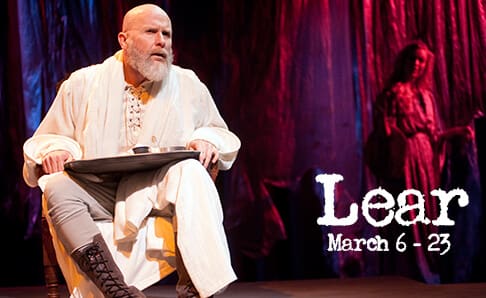The Hillsboro Argus and Oregonlive.com recently published a brilliant preview of LEAR! Click here to read the preview, or peruse the story below!
 King Lear and his daughters are focus of Bag&Baggage adaptation
King Lear and his daughters are focus of Bag&Baggage adaptation
More than a decade ago, Scott Palmer let Shakespeare’s “King Lear” get personal.
While studying for his doctorate in Contemporary Theatre Practice at the University of Glasgow in Scotland, he was asked to direct and adapt a tragedy. Palmer, now artistic director of Hillsboro’s Bag&Baggage Productions, chose to tackle “King Lear,” Shakespeare’s classic work about an aging king who divides his estate among his three daughters.
Palmer, however, noticed that Shakespeare’s focus was more on politics than familial relationships. Wanting to draw King Lear’s daughters, Goneril, Regan and Cordelia, to the forefront of his adaptation, Palmer began researching other playwrights who might have taken a similar approach.
What interested Palmer the most was that Shakespeare’s “King Lear” was itself an adaptation of works that preceded the Bard’s by nearly 600 years, stemming from the legend of a mythological Celtic king.
As Palmer began writing his adaptation, he said he eliminated a majority of the male characters in order to highlight what he considers to be the most important themes of the story: Health, relationships between fathers and daughters, and the power of influence.
“Adapting was a huge part of Shakespeare’s genius,” Palmer said. “I feel it gets me closer to Shakespeare because I’m doing a shadow of that process with my minimal talents and experience. It helps me appreciate his work and different aspects of stories that he wrote.”
One such element of “King Lear” that struck a cord with Palmer was how the story related to his own life.
At the time, Palmer’s mother, one of four sisters, was struggling to help her ailing father, who was suffering from Alzheimer’s disease.
“My personal connection to the basic themes of the story drew me to the versions that were about the relationships between a father and his daughters,” Palmer said.
Actress Rebecca Ridenour, who plays Goneril, King Lear’s eldest daughter, said her character emerges from the play carrying the weight of her own father’s broken expectations.
“With a strict patriarch in charge, it can be hard for children,” Ridenour said. “Her (Goneril’s) feelings weren’t indulged by her father. She never got the pony, the nice gifts. Because of that, I think she grew up into this warrior kind of girl.”
Ridenour said Goneril faces trying times as she deals with a crazed King Lear, played by Kevin Connell, and that father-wounds from her past influence the way she makes decisions.
“I think one of her line’s really sums up the whole show: ‘Striving to better, oft we mar what’s well,’” Ridenour recited. “The issues of family, duty, jealousy, revenge and love that come through in this show – it brings it down to what’s real.”
Playing Goneril has even allowed Ridenour to connect with her own mother in a deeper way than she would have ever expected. Her mom, the eldest of six children, also grew up with a powerful patriarch for a father.
“She wanted to be the apple of her father’s eye,” Ridenour said of her mother.
Similar to Goneril, Ridenour has seen how her mother’s relationship with her father might have been impacted by the weight of expectations.
Like Palmer, Ridenour expects the show’s audience to connect with the play on a deeper level as the characters of King Lear and his daughters are magnified in Palmer’s adaptation, which makes its North American debut when the show opens March 7 at The Venetian Theatre in Hillsboro.
“It’s a family story,” Ridenour said. “It’s a story about people with the best intentions, with these sisters especially. There is no evil on in this play. How we are raised is how we behave.”
— Taylor Smith


Leave a Reply